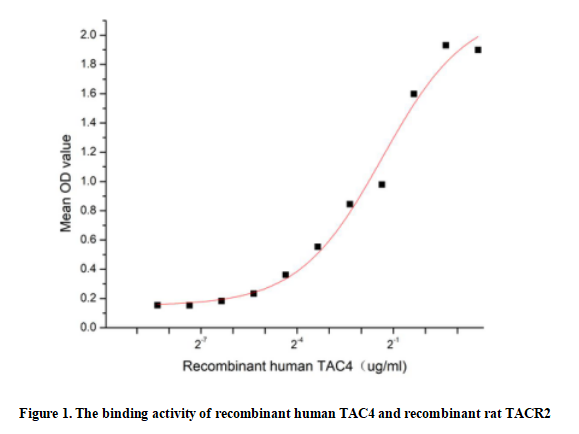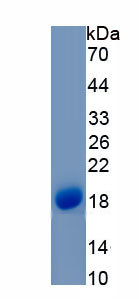Active Tachykinin 4 (TAC4) 

EK; HK-1; PPT-C; Hemokinin; Preprotachykinin-C
- UOM
- FOB US$ 332.00 US$ 830.00 US$ 1,660.00 US$ 4,980.00 US$ 12,450.00
- Quantity
Overview
Properties
- Product No.APD182Hu01
- Organism SpeciesHomo sapiens (Human) Same name, Different species.
- ApplicationsCell culture; Activity Assays.
Research use only - DownloadInstruction Manual
- CategoryNeuro science
- Buffer FormulationPBS, pH7.4, containing 0.01% SKL, 5% Trehalose.
- Traits Freeze-dried powder, Purity > 95%
- Isoelectric Point5.2
Sign into your account
Share a new citation as an author
Upload your experimental result
Review

Contact us
Please fill in the blank.
Activity test

Tachykinin 4 (TAC4) , as known as ESTAC4, EK, HK-1, HK1, PPT-C, is a member of the tachykinin neuropeptide family.TAC4 protein participates in the regulation of blood pressure and is involved in processes such as the negative regulation of systemic arterial blood pressure.It is also associated with the inflammatory response and may play a role in promoting or regulating inflammation. Besides,TAC4 can initiate a series of intracellular signaling pathways by binding to receptors,such as Tachykinin Receptor 2 (TACR2) . Thus a functional binding ELISA assay was conducted to detect the interaction of recombinant human TAC4 and recombinant rat TACR2.Briefly, biotin-linked TAC4 were diluted serially in PBS, with 0.01% BSA (pH 7.4). Duplicate samples of 100μl were then transferred to TACR2-coated microtiter wells and incubated for 1h at 37℃. Wells were washed with PBST 3 times and incubation with Streptavidin-HRP for 30min, then wells were aspirated and washed 5 times. With the addition of substrate solution, wells were incubated 15-25 minutes at 37℃. Finally, add 50µl stop solution to the wells and read at 450nm immediately. The binding activity of TAC4 and TACR2 was shown in Figure 1, the EC50 for this effect is 0.40ug/mL.
Usage
Reconstitute in 10mM PBS (pH7.4) to a concentration of 0.1-1.0 mg/mL. Do not vortex.
Storage
Avoid repeated freeze/thaw cycles. Store at 2-8°C for one month. Aliquot and store at -80°C for 12 months.
Stability
The thermal stability is described by the loss rate. The loss rate was determined by accelerated thermal degradation test, that is, incubate the protein at 37°C for 48h, and no obvious degradation and precipitation were observed. The loss rate is less than 5% within the expiration date under appropriate storage condition.
Increment services
-
 BCA Protein Quantification Kit
BCA Protein Quantification Kit
-
 Molecular Mass Marker for Protein
Molecular Mass Marker for Protein
-
 Monoclonal Antibody Customized Service
Monoclonal Antibody Customized Service
-
 Polyclonal Antibody Customized Service
Polyclonal Antibody Customized Service
-
 Protein Activity Test Experiment Service
Protein Activity Test Experiment Service
-
 Electrophoretic Mobility Shift Assay (EMSA) Experiment Service
Electrophoretic Mobility Shift Assay (EMSA) Experiment Service
-
 Buffer
Buffer
-
 Lentivirus Packaging Experiment Service
Lentivirus Packaging Experiment Service
-
 Adenovirus Packaging Experiment Service
Adenovirus Packaging Experiment Service
-
 Real Time PCR Experimental Service
Real Time PCR Experimental Service
-
 Spike RBD Protein (S-RBD)
Spike RBD Protein (S-RBD)
-
 Protein G
Protein G
-
 Protein A
Protein A







